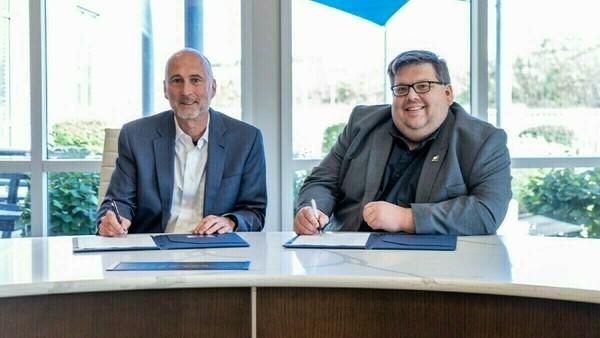Convention on desertification: scaling agricultural innovation and sustainable practices for smallholder farmers
As the world confronts the intertwined crises of biodiversity loss, climate change and land degradation, smallholder farmers—responsible for producing a third of the world’s food—are emerging as critical players in addressing these global challenges. However, despite their potential, systemic barriers, including insecure land tenure, limited financial access and insufficient support for sustainable practices continue to hold them back.
Paul Winters at COP16: scaling agricultural innovations
Paul Winters, associate dean for academic affairs, and the Keough-Hesburgh Professor of Global Affairs at the University of Notre Dame, highlighted these issues during the United Nations Convention to Combat Desertification’s 16th session of the Conference of the Parties (COP16), taking place Dec. 2-13 in Riyadh, Saudi Arabia. The event brought together global leaders, researchers and private sector representatives to address critical issues such as food security in the context of droughts, desertification and the role of the private sector in fostering sustainable agricultural practices.
"Agricultural innovations will be critical to address land degradation and desertification."
Winters participated in two panels during the event, speaking on the importance of scaling up agricultural innovations to combat land degradation.

"Cost-effective and impactful agricultural innovations will be critical to address land degradation and desertification," said Winters, who is also a core affiliated faculty at the Pulte Institute for Global Development at the Keough School. "Management practices, like rainwater harvesting and drought-resistant crops, are being developed and must be taken to scale to effectively address these challenges."
Public private collaboration in sustainable agriculture
During the discussions, Winters shared examples of successful public-private collaborations that are helping to address land degradation.
In Brazil, partnerships between the government and agricultural companies are rehabilitating degraded lands, turning them into productive farmland.
Another example he cited was the use of asset-collateralized loans, which enable smallholder farmers to invest in essential assets like water tanks. These tanks provide a steady water supply, allowing farmers to engage in sustainable agricultural activities, such as dairy farming, and to enhance their income sufficiently to repay the loans.
He also highlighted the potential of tree-planting initiatives funded by private capital. When implemented effectively, these programs can sequester greenhouse gases, restore degraded land, combat desertification and improve farmers’ livelihoods.
Overcoming barriers to smallholder farmer adoption
Winters also spoke about the challenges in ensuring smallholder farmers have access to these innovative solutions.
"While innovations may work with larger-scale farmers, smallholder adoption requires understanding and addressing constraints."
"Governments, companies and researchers often undervalue the importance of inducing the right behavioral responses of smallholders," he noted. "These farmers face constraints related to incentives, market limitations and access to information. While innovations may work in field trials or with larger-scale farmers, ensuring smallholder adoption requires understanding and addressing these constraints."
Throughout the event, Winters underscored the importance of empowering smallholder farmers, prioritizing solutions that address their needs. He said the world can make significant strides toward reducing land degradation and sustainable agriculture through scaling innovations.
"We need to figure out why smallholders are not adopting these innovations and what measures are needed to overcome these barriers," he said.
AIM for Scale: transforming agricultural technology

Winters serves as the executive director of the Secretariat of the Agriculture Innovation Mechanism for Scale (AIM for Scale), which was first announced at COP28 as part of a new partnership between the United Arab Emirates and the Bill and Melinda Gates Foundation. The program is a multi-partner effort to transition evidence-based, cost-effective innovations to scale for the benefit of farmers affected by climate change.
AIM for Scale has developed an Innovation Package aimed at empowering the creation and distribution of weather forecasts to reach hundreds of millions of farmers. This initiative highlights the transformative potential of AI-driven weather forecasting to enable national meteorological and hydrological services to deliver high-quality, farmer-focused forecasts.
Learn More
- Paul Winters biography & research
- Sustainability and environmental justice research at the Keough School
- UN convention to combat desertification
Originally published by at keough.nd.edu on December 20, 2024.
Latest Research
- Karen Deak named Executive Director of Notre Dame’s IDEA CenterKaren Imgrund Deak, pictured above, has been named executive director of the IDEA Center at the University of Notre Dame. Karen…
- Hope, Legacy, and the Fight Against Brain Cancer: The Story Behind the Hahn-Pflueger Brain Cancer Scholar Program“The most powerful thing in this world is hope,” said Rex Pflueger,…
- Notre Dame, Beacon Health System announce new, multiyear research collaborationThe University of Notre Dame and Beacon Health System have announced a new, multiyear research collaboration. Through this agreement, Notre Dame and Beacon will jointly develop collaborative, health-focused research projects that are of interest to both organizations, particularly in the areas of oncology and health data.
- Fighting to cure brain cancerTo better understand glioblastoma, an aggressive brain cancer, a Notre Dame researcher thought outside the box—and off planet Earth. Read the story
- ND electrical engineer Ranjan Singh named founding editor-in-chief of APL Engineering PhysicsRanjan Singh, professor of electrical engineering at the University of Notre Dame and pioneer in terahertz photonics, spintronics and metamaterials, has been named founding editor-in-chief of Applied Physics Letters (APL) Engineering Physics.
- Exceptional faculty recognized as Notre Dame’s 2025 All-Faculty TeamNotre Dame has a long history of outstanding student-athletes being named to All-America teams. The University also has a tradition of honoring exceptional faculty on the football field each fall. At every home game, the provost honors a distinguished member of the faculty. These seven scholar-teachers…












